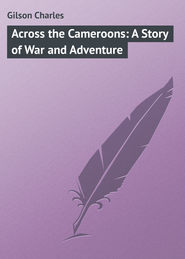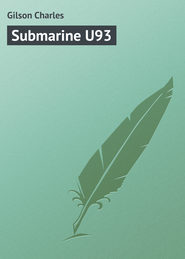По всем вопросам обращайтесь на: info@litportal.ru
(©) 2003-2025.
✖
Treasure of Kings
Настройки чтения
Размер шрифта
Высота строк
Поля
"Haven't got it!" he repeated. "What d'ye mean?"
And the way he rapped out those last few words made my blood run cold. I saw, however, that I must make a clean breast of the matter, let it end which way it would.
"I have not got it," said I, "for a simple reason; because I had thrown it away before you caught me. And now, you know the truth, and can do with me what you will."
The hunchback stood staring at me as if I were a ghost. His thin, wrinkled face had gone a yellow or a greenish colour, and his little eyes looked blacker and more on fire than ever. He kept working his mouth about, as if he were chewing some of his vile tobacco; and, on the whole, I cannot conceive an expression more menacing, a countenance less prepossessing.
He came up to me, and searched my pockets; and whilst he was doing so, I noticed that both his hands were trembling. He had then been joined by both Trust and Forsyth, who stood on either side of him.
Amos, as he drew away from me, came out with an oath that I can never write. Indeed, the swearing of this man was not the least of his many sins.
"He has not got it!" he cried. "We've been fooled, Mr. Forsyth; and that by a slip of a boy!"
I thought that he would kill me, then and there, beneath the shadow of the trees in Slindon Woods. But, though Amos Baverstock often worked himself into fits of ungovernable fury, he never was guilty of a foolish action. For my life-though at the time I never guessed it-was of some use to him. Not only did I know where I had hidden the torn map, but, as like as not, I had looked at it, and might be able to remember the names of some of the places that were marked thereon-knowledge for which Amos would give much. Had it not been for this, I have little doubt he would have put me out of the world.
They tied my feet together, in case I should endeavour to escape, whilst the three seated themselves upon the gnarled surface roots of a great oak tree, and examined their fragment of the map, discussing the question openly, so that I overheard them and learned of the trick that Providence had played us all.
For the map had been rent in twain, not by the hands of Amos Baverstock and me, but by the sure and supple fingers of Almighty Destiny. Amos had in his possession at least three-quarters of the parchment-he had it all, indeed, except one corner, that which I had seized in my attempt to wrench it from his grasp. And, as good luck had it, that one corner contained the information of the greatest value: to wit, the exact locality where the Greater Treasure was to be found.
As for the rest of the map, it carried you from the outskirts of what may pass as modern civilisation to within a certain unknown distance of the secret place. It put you on the right road, as it were, and then left you-lost in the midst of a wilderness of doubt.
When Amos grasped the full significance of this, he jumped to his feet, a perfect figure of fury, storming at me and swearing, using threats and shouting of torture, if I did not then and there confess. But speak I would not. Whatever happened, I was resolved to hold my ground, though I was filled with grave misgivings.
For all that afternoon they badgered me, trying intimidation, bribery and curses; and then, at last, they settled it amongst themselves that they would take me with them into Portsmouth, and thence across the sea into the very heart of a black barbarous country, where they hoped to find the Treasure of the Incas.
It was then, whilst we waited in the woods for sunset, that I saw myself, a lad of sixteen summers, launched upon a series of adventures, among strange peoples and in wild, romantic lands-adventures such as those of which I had often read, of the bold Spaniards who had followed Columbus into a new and unknown world, and brave blades of the stamp of Drake and Grenville, who-like John Bannister himself-were all men of Devon. That I was to be one of a company so glorious seemed to me all my heart could wish, though I went as a hostage with my life itself at ransom.
In a strange fashion, in very truth, did I begin my travels; for I journeyed that night to Portsmouth, not only bound hand and foot and tied to the seat of the dog-cart, but gagged as well; so that, by the time we reached our destination, I ached in every limb.
For three weeks we dwelt together in a lodging-house, patronised by seamen, in a poor quarter of the town. The landlord-a fat, slovenly fellow whose hand was seldom far from a pint mug or near a razor-was, as I guessed, hand in glove with Amos; for he must have known that throughout those three dreary weeks I was kept locked in a stuffy room, where I had neither fresh air nor liberty, and no better fare than is accorded to a convict.
I have said that we dwelt together, but this was not wholly so; for Mr. Gilbert Forsyth, though he was often of our party, had taken rooms in one of the best hotels. He was a gentleman somewhat fastidious in his habits, with a nice taste in wine and clothes, though-as he was soon to prove-he could rough it with the best of us.
Joshua, too, was seldom in our lodgings. It appears that he spent most of his time in the neighbourhood of the docks, on the lookout for an old shipmate whom he knew he could trust, with whom Amos could strike a bargain.
Such a man was eventually found. Joshua brought him in, one evening, and shortly afterwards Mr. Forsyth arrived, looking more than ever as if he had just come out of a bandbox.
This fellow proved to be the skipper of a barque, due to sail in a few days' time, bound for Caracas in Venezuela. She must call first at Liverpool, to take on a cargo of cotton goods, but would touch at no port upon the voyage but Fayal in the Western Islands, which are now called the Azores.
All this fitted in exceedingly well with Amos's plans. As I was in the next room when they talked the matter out, and they never troubled to close the door, I know for a fact that Baverstock bribed the skipper, and that Forsyth-who I suspected all along had undertaken to produce the funds-paid him as much as fifty pounds down, quite apart from the question of passage money, and there was more to come at the end of the voyage.
Gilbert Forsyth, indeed, was a member of the expedition for no other reason than that he supplied the sinews of war, else Amos had never taken him into his confidence and agreed to forego a third part of the loot. For all that, Forsyth proved himself a man of action and resource, though he never looked it; and things would have gone worse with Amos than they did, had he not had at his right hand one so capable and cool throughout those wild, adventurous days.
For Joshua Trust was well enough in his way to strike a blow or carry a camp-kettle across a mountain range that topped the clouds-otherwise he was a bull-in-a-china-shop kind of a fellow, whose worth was in his forearms and not his head.
But Forsyth was cast in a finer mould: a man of education, with tags of Latin in the corners of memory, a sense of humour-subtle enough to be lost upon both his strange companions-and a wonderful brain for figures.
The man's laziness was all pretence and affectation. He always talked as if he were half asleep, and yawned at intervals, screening his mouth with a hand upon one of the fingers of which he wore a golden signet ring; and yet, his brain was ever active, and he had the happy knack of doing the right thing at the right time-as he had already proved to my cost.
Even whilst I lay imprisoned in that dingy room in Portsmouth, Forsyth returned along the coast to within a stone's throw of John Bannister's cabin by the sea, and searched vainly for the fragment of the map which I had thrown away. And that in itself was a bold thing to do; for the police-to whom Bannister had described the appearance of both Baverstock and Trust-had been told of my disappearance, and the countryside, from Arundel to Chichester, was populous with printed offers of reward.
For, all this time, my mother was well near distracted by anxiety and distress. John Bannister called upon her, and tried in his own straightforward way to set her fears at rest, and swore to her that he would find me, though he had to search the world.
Of how well he kept his oath it is my task to write, and of much else besides. For the barque, which was called the Mary Greenfield, dropped her pilot off the Needles of the Isle of Wight, and with a fair wind and under full canvas struck the open sea. And I, Dick Treadgold, was on board, sea-sick that night as any full-grown man could be, and sick at heart as well. For, when the white cliffs of dearest England faded in the evening light, I realised for the first time that I was alone, and there was no telling what the Fates held in store for me.
CHAPTER VI-I AM CONCERNED IN A MUTINY
I have neither space nor patience to describe in any detail that long and tedious voyage. For we were months at sea. I saw whales spouting water into the air, and schools of porpoises; and at one time, for a whole month on end, we were becalmed, the ship lying idle in the midst of a vast floating mass of seaweed, where there were all kinds of jelly-fish and squids. The heat was excessive, and there was a rank, almost putrid, smell in the air, which came from the decaying seaweed. That in itself was enough to try the temper of every member of the crew; but, to make matters worse, much of the tinned meat on board exploded in the hold. I cannot explain this, but I know that it happened, and am content to leave the explanation to the scientific reader. These circumstances, together with the surly nature of James Dagg, the captain, led from dissatisfaction to open grumbling, and thence to the mutiny of which I have now to tell.
My own fortunes were, to some extent, involved in that affair; and in any case, I must describe the incident more or less as it occurred, since nothing could better serve to illustrate the true character of Amos Baverstock, who plays as important a part as myself in the narrative that follows.
I had not been a week at sea, and just recovered from my sickness, when I was given clearly to understand that I was to hold no intercourse with any of the crew. I cannot say that I wished to, for they were a ruffianly lot-half of them, I verily believe, prison-birds, like Joshua Trust, and the remainder West Indian negroes, Chinamen, and Lascars from the coast of Malabar.
I had to share a cabin with Amos himself, who seldom let me out of his sight. Thrown into such close intimacy with the man, I learned much concerning him, and he more of me. He seldom allowed a day to pass without questioning me in regard to what I knew of the map; and so terrible did his threats become that I was filled with fear for the future.
On that account, I yearned for a friend, someone in whom I could confide; and it was not long before I found such a man on board that pestilential ship. Now that I can look back upon my series of adventures, I can see both men and matters in their true perspective, and I realise that, had it not been for William Rushby, the boatswain of the Mary Greenfield, the most honest and the whitest man that ever piped all hands on deck, this tale had never been told.
When I saw him first, I sized him up as the true seaman that he was; but I dared not speak to him, because of the threats that had been heaped upon me. I knew also that I could go to none of the ship's officers with my story, for they were all tarred with the same brush as the skipper; but Providence before long gave me the chance I wanted.
When we were in mid-ocean Amos tired of the voyage, and required little persuasion from Mr. Forsyth to take to playing cards. Captain Dagg was a card-player, too, and Joshua made the fourth; and this was the party that sat down nightly after supper to gamble, drink and smoke, by the light of a reeking paraffin lamp in the little stuffy saloon.
I watched them play for many nights, and though I knew nothing of the game, it was quite clear to me that they were three babes at the business by the side of Mr. Forsyth. For it was he who always won, no matter with whom he played or what cards he held, and it was he who raked in their money.
This was all one to me. I soon tired of watching them; and when I had once slipped away from them, to breathe the fresh air on deck, and no questions had been asked, I made it my constant practice to sit of an evening upon the poop, whence I could look down into the water and see the phosphorus as if smouldering in the wake of the ship.
And here it was that I talked with William Rushby. At that hour it was his duty to see that the ship's lamps were lighted, and when he had hoisted the mast-head lights, and put the red light to port and the green to starboard, he would come aft, haul in the log, and speak to me in whispers.
That he took that precaution from the first makes it plain enough that he guessed some mischief was afoot. He questioned me concerning who I was and what business I had in such company on board that ship. It was some time before I dared tell him the truth, for fear of Amos Baverstock; but I did so in the end, making him swear to keep my secret; which he did.
"It is all like a fairy tale," said he, when he had heard my story; "and it's hard to tell the best way to help you. Of this much I am certain: if you set forth into the back country of Venezuela with a man like Baverstock, you'll not come back alive."
"But I cannot escape!" I protested. "Even on board this ship, I am watched at all hours of the night and day."
Rushby thought for a while, stroking his short black beard which was like that of a Russian Czar.
"Maybe," said he, "at Caracas, I could desert and take you with me. I have no liking for my shipmates here, as you may well imagine. In the meantime, many weeks must pass before we sight the mainland, and in that time much may happen."
As he said this with some significance, I asked him what he meant.
"Why, just this," he answered; "there's trouble brewing aboard, which will come to a head before we touch port. The crew are a low-down, blackguard lot, no better men than sailors; and though they may be held to blame for that, it's no fault of theirs if they are fed worse than swine and cursed from dawn to sunset. Dagg I had heard about, though I never signed on under him before, nor will again, and the mate's even worse. There's high talk in the fo'c'sle, as it is, where the ringleader is that nigger cook. Mark my words-and I've sailed the seas for more than twenty years-a prize-fighting negro in the galley can cause more mischief aboard a sailing-ship than a monkey and a woman, both in one."
I laughed, for I was not then accustomed to the talk of sailors.
"And they've run out of lime-juice," he went on; "and that's a serious thing."
"Lime-juice!" I repeated, thinking he was joking still.
"A man must eat vegetables," he explained to me, "to keep his blood cool and his liver nicely trimmed. You can't eat green cabbages and Brussels-sprouts in mid-Atlantic, so you must carry lime-juice aboard; and we've run out. The men have much to complain of. They are in ill health, and one or two should be lying up in a sick berth, instead of being sworn at left and right for not moving quicker. So I see trouble ahead. It may be a hurricane, or just a summer squall; and if the first, Heaven help James Dagg and his officers, for they're a tough lot for'ard, as I know who've listened to their talk."








